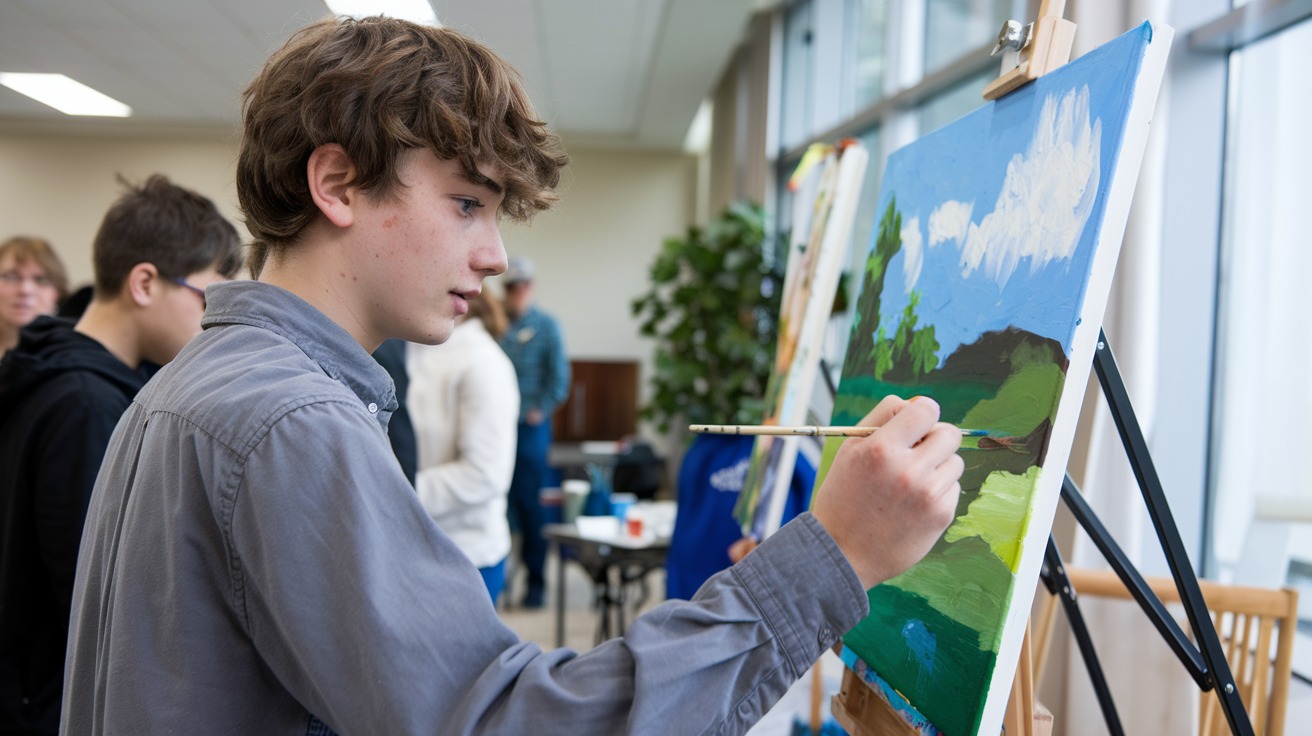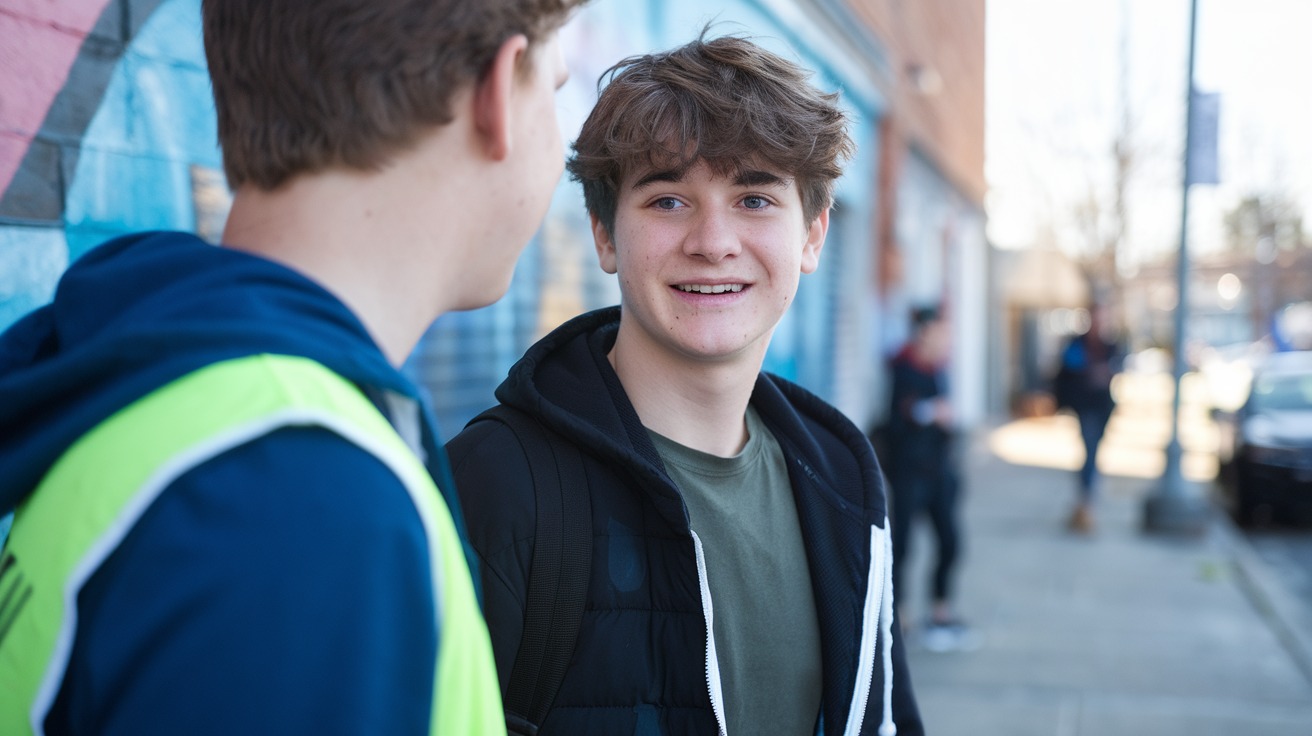I Encouraged A Reserved Boy To Attend Parties, Unknowingly Causing Him Deeper Emotional Pain
I agreed to tutor Tommy, a quiet and reserved boy. Hoping to help him open up, I encouraged him to attend parties and join activities with his classmates. Little did I know that my advice would lead to even greater emotional harm for him.
I was a senior in college, interning at a local high school. One day, the career counselor introduced me to Tommy, a freshman who needed help with math. She explained that Tommy was a shy boy who struggled academically and had no friends. Her voice carried a note of concern, and I realized this boy needed more than just an ordinary tutor.
Meeting Tommy for the first time was a challenge. His home was so quiet you could hear the clock ticking in the background. Tommy sat huddled on a chair, his gaze fixed on the floor. Despite my gentle attempts to engage him in conversation, he gave only brief, whispered responses, avoiding eye contact entirely. It felt as though every word he spoke required immense effort.

However, as our lessons progressed, I saw that Tommy was far more intelligent than he seemed. He quickly grasped the math problems I explained, though he hesitated to answer out loud. His struggles were not with knowledge but confidence. Tommy was like a bright light hidden behind the shadow of self-doubt and insecurity.
I felt a deep sympathy for him. Tommy didn’t just need better grades; he needed someone to help him open up. With the enthusiasm of a young college student, I resolved to be more than just a tutor. I wanted to be a friend who could guide Tommy toward self-assurance and social acceptance.
In the following days, I encouraged Tommy to try new things, both academically and socially. One afternoon, while sitting at his study desk, I smiled and gently suggested, “Tommy, why don’t you attend a birthday party with your classmates? It could be fun.”
He hesitated, his gaze dropping to the desk. “I don’t know what to say to them,” he murmured.
“That’s okay,” I reassured him, maintaining a patient and kind tone. “If you open up, they’ll open up to you too.”

Tommy looked out the window, his uncertainty evident. Finally, with a sigh, he admitted, “But what if they don’t like me?”
“They might surprise you. Give them a chance,” I said, offering a warm smile. “If you try, they’ll see how wonderful you are.”
After a long pause, Tommy gave a hesitant nod. A faint glimmer of hope appeared in his eyes, and I felt relieved that my words had sparked some courage in him.
Tommy eventually took my advice. He attended a classmate’s birthday party and began trying to connect with his peers. But I couldn’t foresee how my encouragement would lead to a worse situation for him.
One afternoon, I arrived at Tommy’s house for a lesson. When he opened the door, his face was downcast, and his red, puffy eyes hinted that he had been crying. Alarmed, I immediately asked, “Tommy, what happened?”

He shook his head, avoiding my gaze. His hands hung limply at his sides as though he wanted to disappear. “Nothing,” he whispered, his voice weak and weary.
“Tommy, you can tell me. I can see you’re upset,” I pressed gently, my eyes searching his, hoping he would understand that I genuinely cared.
Tommy didn’t respond immediately. He stared at the floor, his small frame seeming to shrink inward as though trying to shield himself from the fear and unease enveloping him. His disheveled hair fell over part of his face, hiding his eyes from view, but I could feel the sadness and tension in every small movement he made. His furrowed brow suggested he was trying to hold back his emotions, unwilling to let me see the pain inside him.
After a while, he let out a heavy sigh, his voice weak as though confessing something he didn’t want to admit. “It’s just… everything feels so hard for me…” He trailed off, as if unable to find the words to fully explain what weighed on his heart.

I fell silent for a moment, sensing the despair in his voice. Finally, I decided to take a gentler approach, not wanting to pressure him but rather to create a safe space for him to share. “Did something happen at the birthday party?” I asked, my tone soft yet full of concern.
Tommy stayed silent, his eyes still fixed on the floor, avoiding my gaze. He didn’t respond, didn’t even look at me. The silence between us stretched, growing heavier with each passing second. I could see the struggle within him—a part of him wanted to share, but another part was too afraid.
I didn’t push further. I simply sat beside him, offering my quiet presence, hoping he would find the courage to open up.
In the days that followed, Tommy remained in the same state—exhausted and despondent. He started arriving late to class, his eyes perpetually clouded with sadness, devoid of their usual spark. Even during our tutoring sessions, he no longer engaged as he used to.
Instead, he sat withdrawn, his shoulders hunched as though the weight of his worries and sorrow had drained all the energy from him.

One day, during lunch break at school, I happened to walk past a hallway and overheard a group of students talking. Their laughter echoed, but it wasn’t the sound of joyful laughter. It was mocking, filled with malice. I stopped in my tracks, straining to listen while keeping myself hidden.
“Why did he even come to the birthday party? He usually never shows up anywhere,” one voice said.
“Tommy? At the party, we poured water all over him, and he just sat there and took it!” another voice chimed in, followed by cruel snickers.
In that moment, it felt like a hard punch to my chest. Their words echoed in my mind, paralyzing me. I couldn’t move; I couldn’t breathe. Those words sent chills down my spine.
They were talking about Tommy—the same Tommy I had encouraged to attend social events, thinking it would help him make friends and feel included. Instead of finding connection, those events had turned into spaces of humiliation and pain for him. Why did he have to endure such cruelty?

That evening, when I arrived for the tutoring session, I felt a heavy weight in my chest—an overwhelming mix of worry and guilt. I knew I had to address what had happened, but I struggled to find the right words. Finally, I gently asked, “Tommy, something happened at the party, didn’t it?”
At first, Tommy just shook his head, his eyes fixed on the ground, his fists clenched tightly, as if trying to suppress the storm of emotions within him. He didn’t reply, sitting there in silence, his lips pressed together in a thin line, caught in an internal battle. But after a while, his red-rimmed eyes filled with tears, and a single drop rolled down his cheek.
His voice trembled, filled with both anger and pain, “You told me to go, that people would like me, but they hate me even more now! I’m not like them, and they’ll never accept me!”
Those words hit me like a sharp blade. It felt as if someone had slapped me hard across the face, leaving a deep, aching sting in my chest. I didn’t know what to do; the apologies I wanted to say got stuck in my throat. I could only sit there, watching Tommy cry, feeling utterly helpless.

Sitting across from him, I managed to choke out, “I’m sorry, Tommy.”
But the look in Tommy’s eyes froze me in place. He didn’t say anything, just stared at me with a gaze filled with disappointment and hurt. That gaze pierced through me, twisting my heart painfully. I couldn’t bear to look at him anymore; it felt as though a thousand tiny cuts were tearing me apart from the inside.
I felt like a complete failure. What I thought was helping him had instead become a massive burden for him to bear. My attempts to encourage him to socialize and attend parties had inadvertently pushed him further into a world of loneliness and hurt.
I had imposed my own perspective on him without understanding that this wasn’t how he wanted to face the world.
I began questioning whether I truly understood this boy at all. I had tried to help him fit in, thinking it was the right thing to do, but I had been wrong. Tommy didn’t need to change himself to fit in with those around him. He needed to be accepted for who he was.
As Tommy cried, I felt pain not just for him but for myself as well. I realized I hadn’t really listened to him. I hadn’t understood what he truly needed. My advice, though well-intentioned, had inadvertently hurt him more than I could have imagined.

The situation reached its peak when Tommy skipped school one day and refused to leave his room. I understood that something serious was happening.
I decided to visit his house, my heart heavy with unease. Standing in front of Tommy’s door, I could feel my heart pounding as chaotic thoughts raced through my mind. Gently knocking on the door, I called out, “Tommy, what’s wrong?”
There was no reply. The silence dragged on, as if he was trying to hide all his emotions behind that door. I patiently waited, listening for the faintest sound from inside. After a while, the door creaked open. Tommy stood there, his eyes puffy and red as though he had been crying. His gaze was filled with hurt, but there was a faint glimmer of fragile hope within.
“I don’t want to go to school anymore,” he whispered, his voice hoarse from holding back emotions.

My heart ached. I sat next to him on the edge of his bed, struggling to find the right words as a lump formed in my throat. “Tommy, I’m sorry…” I said softly, looking at him with all the sincerity I could muster.
Tommy looked down, his small hands clenched tightly at the hem of his shirt. I could feel the anger, sadness, and disappointment brewing within him.
“I shouldn’t have imposed my ideas on you. I thought I knew what was best for you, but the truth is, I didn’t understand you at all,” I said, my voice cracking with guilt.
Tommy remained silent for what felt like an eternity. Eventually, I noticed him taking a deep breath, as if trying to regain his composure. His gaze softened slightly.

Out of the corner of my eye, I noticed something on the desk—a drawing that had been hurriedly folded. For some reason, curiosity stirred within me, and I moved closer to take a look. Carefully unfolding it, I was stunned.
It was a landscape drawing, meticulously detailed and vibrant. I had never seen Tommy draw before, and I was amazed at how beautiful his work was.
“Tommy, you like drawing, don’t you?” I smiled, trying to create a comfortable atmosphere so he wouldn’t feel self-conscious. He nodded shyly, blinking rapidly as if to hide his emotions.
“I didn’t know you could draw so well,” I complimented, my voice filled with genuine surprise and pride. “My brother runs a small art class. Would you like to join? There are only four students, and if you’re nervous, I can ask him to arrange a private class for you.”

My suggestion seemed to spark a rare glimmer of excitement in Tommy’s eyes. He looked at me, his gaze a mix of doubt and hope, as though he couldn’t quite believe it was possible. Seeing this reaction brought a small sense of relief and joy to me.
The next day, I received news from my brother that Tommy had joined the art class. Though he didn’t speak much during the session, my brother mentioned that Tommy had smiled happily while drawing. It was a positive sign for me.
A few days later, during one of our tutoring sessions, Tommy shared something with me that lifted a heavy weight off my heart. He told me that at the art center, he had made a new friend. They shared the same interest in art and had gradually grown closer.
Those words deeply moved me. Tommy no longer felt lonely or out of place; he had found someone who understood him. Now, he attends regular art classes with other students, no longer needing a private session.

One evening, as I arrived for tutoring, Tommy suddenly said, “I made this today,” holding up a colorful landscape painting. It was the first time he had willingly shared something he had created. That painting wasn’t just a collection of brushstrokes; it was a piece of his emotions, a glimpse into the world he had built for himself.
I smiled, feeling as if the first rays of sunlight were gently warming my heart. Joy, relief, and pride washed over me. Tommy’s small steps forward were the clearest signs that he was beginning to open up and find happiness in his life.
It was a feeling hard to describe, but I knew I had done the right thing by listening to and respecting his interests. My little student was no longer just painting beautiful pictures; he was crafting a new life for himself—one filled with connections and joys that he truly deserved.
This story draws inspiration from real-life events and individuals, but it has been adapted and fictionalized for creative expression. Names, characters, and specific details have been altered to protect individuals’ privacy and to enhance the storyline. Any similarity to real persons, living or deceased, or actual events is coincidental and unintentional.

